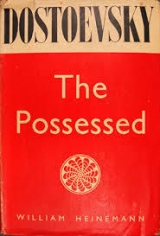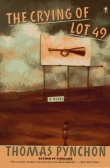
Текст книги "The Possessed"
Автор книги: Федор Достоевский
сообщить о нарушении
Текущая страница: 7 (всего у книги 49 страниц)
“Allow me to ask, which is my nearest way to Bykovy Street?”
“To Bykovy Street? Oh, that's here, close by,” I cried in great excitement. “Straight on along this street and the second turning to the left.”
“Very much obliged to you.”
A curse on that minute! I fancy I was shy, and looked cringing. He instantly noticed all that, and of course realised it all at once; that is, realised that I knew who he was, that I had read him and revered him from a child, and that I was shy and looked at him cringingly. He smiled, nodded again, and walked on as I had directed him. I don't know why I turned back to follow him; I don't know why I ran for ten paces beside him. He suddenly stood still again.
“And could you tell me where is– the nearest cab-stand?” he shouted out to me again.
It was a horrid shout! A horrid voice!
“A cab-stand? The nearest cab-stand is ... by the Cathedral; there are always cabs standing there,” and I almost turned to run for a cab for him. I almost believe that that was what he expected me to do. Of course I checked myself at once, and stood still, but he had noticed my movement and was still watching me with the same horrid smile. Then something happened which I shall never forget.
He suddenly dropped a tiny bag, which he was holding in his left hand; though indeed it was not a bag, but rather a little box, or more probably some part of a pocket-book, or to be more accurate a little reticule, rather like an old-fashioned lady's reticule, though I really don't know what it was. I only know that I flew to pick it up.
I am convinced that I did not really pick it up, but my first motion was unmistakable. I could not conceal it, and, like a fool, I turned crimson. The cunning fellow at once got all that could be got out of the circumstance.
“Don't trouble, I'll pick it up,” he pronounced charmingly; that is, when he was quite sure that I was not going to pick up the reticule, he picked it up as though forestalling me, nodded once more, and went his way, leaving me to look like a fool. It was as good as though I had picked it up myself. For five minutes I considered myself utterly disgraced for ever, but as I reached Stepan Trofimovitch's house I suddenly burst out laughing; the meeting struck me as so amusing that I immediately resolved to entertain Stepan Trofimovitch with an account of it, and even to act the whole scene to him.
III
But this time to my surprise I found an extraordinary change in him. He pounced on me with a sort of avidity, it is true, as soon as I went in, and began listening to me, but with such a distracted air that at first he evidently did not take in my words. But as soon as I pronounced the name of Karmazinov he suddenly flew into a frenzy.
“Don't speak of him! Don't pronounce that name!” he exclaimed, almost in a fury. “Here, look, read it! Read it!”
He opened the drawer and threw on the table three small sheets of paper, covered with a hurried pencil scrawl, all from Varvara Petrovna. The first letter was dated the day before yesterday, the second had come yesterday, and the last that day, an hour before. Their contents were quite trivial, and all referred to Karmazinov and betrayed the vain and fussy uneasiness of Varvara Petrovna and her apprehension that Karmazinov might forget to pay her a visit. Here is the first one dating from two days before. (Probably there had been one also three days before, and possibly another four days before as well.)
“If he deigns to visit you to-day, not a word about me, I beg. Not the faintest hint. Don't speak of me, don't mention me.– V. S.”
The letter of the day before:
“If he decides to pay you a visit this morning, I think the most dignified thing would be not to receive him. That's what I think about it; I don't know what you think.– V. S.”
To-day's, the last:
“I feel sure that you're in a regular litter and clouds of tobacco smoke. I'm sending you Marya and Fomushka. They'll tidy you up in half an hour. And don't hinder them, but go and sit in the kitchen while they clear up. I'm sending you a Bokhara rug and two china vases. I've long been meaning to make you a present of them, and I'm sending you my Teniers, too, for a time.! You can put the vases in the window and hang the Teniers on the right under the portrait of Goethe; it will be more conspicuous there and it's always light there in the morning. If he does turn up at last, receive him with the utmost courtesy but try and talk of trifling matters, of some intellectual subject, and behave as though you had seen each other lately. Not a word about me. Perhaps I may look in on you in the evening.– V. S.
“P.S.– If he does not come to-day he won't come at all.”
I read and was amazed that he was in such excitement over such trifles. Looking at him inquiringly, I noticed that he had had time while I was reading to change the everlasting white tie he always wore, for a red one. His hat and stick lay on the table. He was pale, and his hands were positively trembling.
“I don't care a hang about her anxieties,” he cried frantically, in response to my inquiring look. “ Je m'en fiche!She has the face to be excited about Karmazinov, and she does not answer my letters. Here is my unopened letter which she sent me back yesterday, here on the table under the book, under L'Homme qui rit.What is it to me that she's wearing herself out over Nikolay! Je m'en fiche, et je proclame ma liberte! Au diable le Karmazinov! Au diable la Lembke!I've hidden the vases in the entry, and the Teniers in the chest of drawers, and I have demanded that she is to see me at once. Do you hear. I've insisted! I've sent her just such a scrap of paper, a pencil scrawl, unsealed, by Nastasya, and I'm waiting. I want Darya Pavlovna to speak to me with her own lips, before the face of Heaven, or at least before you. Vous me seconderez, n'est-ce pas, comme ami et timoin.I don't want to have to blush, to lie, I don't want secrets, I won't have secrets in this matter. Let them confess everything to me openly, frankly, honourably and then . . . then perhaps I may surprise the whole generation by my magnanimity. . . . Am I a scoundrel or not, my dear sir?” he concluded suddenly, looking menacingly at me, as though I'd considered him a scoundrel.
I offered him a sip of water; I had never seen him like this before. All the while he was talking he kept running from one end of the room to the other, but he suddenly stood still before me in an extraordinary attitude.
“Can you suppose,” he began again with hysterical haughtiness, looking me up and down, “can you imagine that I, Stepan Verhovensky, cannot find in myself the moral strength to take my bag – my beggar's bag – and laying it on my feeble shoulders to go out at the gate and vanish for ever, when honour and the great principle of independence demand it I It's not the first time that Stepan Verhovensky has had to repel despotism by moral force, even though it be the despotism of a crazy woman, that is, the most cruel and insulting despotism which can exist on earth, although you have, I fancy, forgotten yourself so much as to laugh at my phrase, my dear sir! Oh, you don't believe that I can find the moral strength in myself to end my life as a tutor in a merchant's family, or to die of hunger in a ditch! Answer me, answer at once; do you believe it, or don't you believe it?”
But I was purposely silent. I even affected to hesitate to wound him by answering in the negative, but to be unable to answer affirmatively. In all this nervous excitement of his there was something which really did offend me, and not personally, oh, no! But ... I will explain later on. He positively turned pale.
“Perhaps you are bored with me, G– v (this is my surname),
and you would like . . . not to come and see me at all?” he said in that tone of pale composure which usually precedes some extraordinary outburst. I jumped up in alarm. At that moment Nastasya came in, and, without a word, handed Stepan Trofimovitch a piece of paper, on which something was written in pencil. He glanced at it and flung it to me. On the paper, in Varvara Petrovna's hand three words were written: “Stay at home.”
Stepan Trofimovitch snatched up his hat and stick in silence and went quickly out of the room. Mechanically I followed him. Suddenly voices and sounds of rapid footsteps were heard in the passage. He stood still, as though thunder-struck.
“It's Liputin; I am lost!” he whispered, clutching at my arm.
At the same instant Liputin walked into the room.
IV
Why he should be lost owing to Liputin I did not know, and indeed I did not attach much significance to the words; I put it all down to his nerves. His terror, however, was remarkable, and I made up my mind to keep a careful watch on him.
The very appearance of Liputin as he came in assured us that he had on this occasion a special right to come in, in spite of the prohibition. He brought with him an unknown gentleman, who must have been a new arrival in the town. In reply to the senseless stare of my petrified friend, he called out immediately in a-loud voice:
“I'm bringing you a visitor, a special one! I make bold to intrude on your solitude. Mr. Kirillov, a very distinguished civil engineer. And what's more he knows your son, the much esteemed Pyotr Stepanovitch, very intimately; and he has a message from him. He's only just arrived.”
“The message is your own addition,” the visitor observed curtly. “There's no message at all. But I certainly do know Verhovensky. I left him in the X. province, ten days ahead of us.”
Stepan Trofimovitch mechanically offered his hand and motioned him to sit down. He looked at me* he looked at Liputin, and then as though suddenly recollecting himself sat down himself, though he still kept his hat and stick in his hands without being aware of it.
“Bah, but you were going out yourself! I was told that you were quite knocked up with work.”
“Yes, I'm ill, and you see, I meant to go for a walk, I ...” Stepan Trofimovitch checked himself, quickly flung his hat and stick on the sofa and – turned crimson.
Meantime, I was hurriedly examining the visitor. He was a young man, about twenty-seven, decently dressed, well made, slender and dark, with a pale, rather muddy-coloured face and black lustreless eyes. He seemed rather thoughtful and absent-minded, spoke jerkily and ungrammatically, transposing words in rather a strange way, and getting muddled if he attempted a sentence of any length. Liputin was perfectly aware of Stepan Trofimovitch's alarm, and was obviously pleased at it. He sat down in a wicker chair which he dragged almost into the middle of the room, so as to be at an equal distance between his host and the visitor, who had installed themselves on sofas on opposite sides of the room. His sharp eyes darted inquisitively from one corner of the room to another.
“It's .... a long while since I've seen Petrusha. . . . You met abroad?” Stepan Trofimovitch managed to mutter to the visitor.
“Both here and abroad.”
“Alexey Nilitch has only just returned himself after living four years abroad,” put in Liputin. “He has been travelling to perfect himself in his speciality and has come to us because he has good reasons to expect a job on the building of our railway bridge, and he's now waiting for an answer about it. He knows the Drozdovs and Lizaveta Nikolaevna, through Pyotr Stepanovitch.”
The engineer sat, as it were, with a ruffled air, and listened with awkward impatience. It seemed to me that he was angry about something.
“He knows Nikolay Vsyevolodovitch too.”
“Do you know Nikolay Vsyevolodovitch?” inquired Stepan Trofimovitch.
“I know him too.”
“It's . . . it's a very long time since I've seen Petrusha, and ... I feel I have so little right to call myself a father . . . c'est le mot; I . . . how did you leave him?”
“Oh, yes, I left him ... he comes himself,” replied Mr. Kirillov, in haste to be rid of the question again. He certainly was angry.
“He's coming! At last I ... you see, it's very long since I've see Petrusha!” Stepan Trofimovitch could not get away from this phrase. “Now I expect my poor boy to whom . . . to whom I have been so much to blame! That is, I mean to say, when I left him in Petersburg, I ... in short, I looked on him as a nonentity, quelque chose dans ce genre.He was a very nervous boy, you know, emotional, and . . . very timid. When he said his prayers going to bed he used to bow down to the ground, and make the sign of the cross on his pillow that he might not die in the night. . . . Je m'en souviens. Enfin,no artistic feeling whatever, not a sign of anything higher, of anything fundamental, no embryo of a future ideal . . . c'etait comma un petit idiot,but I'm afraid I am incoherent; excuse me . . . you came upon me . . .”
“You say seriously that he crossed his pillow?” the engineer asked suddenly with marked curiosity.
“Yes, he used to . . .”
“All right. I just asked. Go on.”
Stepan Trofimovitch looked interrogatively at Liputin.
“I'm very grateful to you for your visit. But I must confess I'm ... not in a condition . . . just now . . . But allow me to ask where you are lodging.”
“At Filipov's, in Bogoyavlensky Street.”
“Ach, that's where Shatov lives,” I observed involuntarily.
“Just so, in the very same house,” cried Liputin, “only Shatov lodges above, in the attic, while he's down below, at Captain Lebyadkin's. He knows Shatov too, and he knows Shatov's wife. He was very intimate with her, abroad.”
“ Comment!Do you really know anything about that unhappy marriage de ce pauvre amiand that woman,” cried Stepan Trofimovitch, carried away by sudden feeling. “You are the first man I've met who has known her personally; and if only ...”
“What nonsense!” the engineer snapped out, flushing all over. “How you add to things, Liputin! I've not seen Shatov's wife; I've only once seen her in the distance and not at all close... . I know Shatov. Why do you add things of all sorts?”
He turned round sharply on the sofa, clutched his hat, then laid it down again, and settling himself down once more as before, fixed his angry black eyes on Stepan Trofimovitch with a sort of defiance. I was at a loss to understand such strange irritability.
“Excuse me,” Stepan Trofimovitch observed impressively. “I understand that it may be a very delicate subject. ...”–'
“No sort of delicate subject in it, and indeed it's shameful, and I didn't shout at you that it's nonsense, but at Liputin, because he adds things. Excuse me if you took it to yourself. I know Shatov, but I don't know his wife at all ... I don't know her at all!”
“I understand. I understand. And if I insisted, it's only because I'm very fond of our poor friend, noire irascible ami,and have always taken an interest in him. ... In my opinion that man changed his former, possibly over-youthful but yet sound ideas, too abruptly. And now he says all sorts of things about notre Sainte Russieto such a degree that I've long explained this upheaval in his whole constitution, I can only call it that, to some violent shock in his family life, and, in fact, to his unsuccessful marriage. I, who know my poor Russia like the fingers on my hand, and have devoted my whole life to the Russian people, I can assure you that he does not know the Russian people, and what's more . . .”
“I don't know the Russian people at all, either, and I haven't time to study them,” the engineer snapped out again, and again he turned sharply on the sofa. Stepan Trofimovitch was pulled up in the middle of his speech.
“He is studying them, he is studying them,” interposed Liputin. “He has already begun the study of them, and is writing a very interesting article dealing with the causes of the increase of suicide in Russia, and, generally speaking, the causes that lead to the increase or decrease of suicide in society. He has reached amazing results.”
The engineer became dreadfully excited. “You have no right at all,” he muttered wrathfully. “I'm not writing an article. I'm not going to do silly things. I asked you confidentially, quite by chance. There's no article at all. I'm not publishing, and you haven't the right . . .” Liputin was obviously enjoying himself.
“I beg your pardon, perhaps I made a mistake in calling your literary work an article. He is only collecting observations, and the essence of the question, or, so to say, its moral aspect he is not touching at all. And, indeed, he rejects morality itself altogether, and holds with the last new principle of general destruction for the sake of ultimate good. He demands already more than a hundred million heads for the establishment of common sense in Europe; many more than they demanded at the last Peace Congress. Alexey Nilitch goes further than anyone in that sense.” The engineer listened with a pale and contemptuous smile. For half a minute every one was silent.
“All this is stupid, Liputin,” Mr. Kirillov observed at last, with a certain dignity. “If I by chance had said some things to you, and you caught them up again, as you like. But you have no right, for I never speak to anyone. I scorn to talk. . . . If one has a conviction then it's clear to me. . . . But you're doing foolishly. I don't argue about things when everything's settled. I can't bear arguing. I never want to argue. . . .”
“And perhaps you are very wise,” Stepan Trofimovitch could not resist saying.
“I apologise to you, but I am not angry with anyone here,” the visitor went on, speaking hotly and rapidly. '' I have seen few people for four years. For four years I have talked little and have tried to see no one, for my own objects which do not concern anyone else, for four years. Liputin found this out and is laughing. I understand and don't mind. I'm not ready to take offence, only annoyed at his liberty. And if I don't explain my ideas to you,” he concluded unexpectedly, scanning us all with resolute eyes, “it's not at all that I'm afraid of your giving information to the government; that's not so; please do not imagine nonsense of that sort.”
No one made any reply to these words. We only looked at each other. Even Liputin forgot to snigger.
“Gentlemen, I'm very sorry”– Stepan Trofimovitch got up resolutely from the sofa —“ but I feel ill and upset. Excuse me.”
“Ach, that's for us to go.” Mr. Kirillov started, snatching up his cap. “It's a good thing you told us. I'm so forgetful.”
He rose, and with a good-natured air went up to Stepan Trofimovitch, holding out his hand.
“I'm sorry you're not well, and I came,”
“I wish you every success among us,” answered Stepan Trofimovitch, shaking hands with him heartily and without haste. 'I understand that, if as you say you have lived so long abroad, cutting yourself off from people for objects of your own and forgetting Russia, you must inevitably look with wonder on us who are Russians to the backbone, and we must feel the same about you. Mais cela passera.I'm only puzzled at one thing: you want to build our bridge and at the same time you declare that you hold with the principle of universal destruction. They won't let you build our bridge.”
“What! What's that you said? Ach, I say!” Kirillov cried, much struck, and he suddenly broke into the most frank and good-humoured laughter. For a moment his face took a quite childlike expression, which I thought suited him particularly. Liputin rubbed his hand with delight at Stepan Trofimovitch's witty remark. I kept wondering to myself why Stepan Trofimovitch was so frightened of Liputin, and why he had cried out “I am lost” when he heard him coming. We were all standing in the doorway. It was the moment when hosts and guests hurriedly exchange the last and most cordial words, and then part to their mutual gratification.
“The reason he's so cross to-day,” Liputin dropped all at once, as it were casually, when he was just going out of the room, “is because he had a disturbance to-day with Captain Lebyadkin over his sister. Captain Lebyadkin thrashes that precious sister of his, the mad girl, every day with a whip, a real Cossack whip, every morning and evening. So Alexey Nilibch has positively taken the lodge so as not to be present. Well, good-bye.”
“A sister? An invalid? With a whip?” Stepan Trofimovitch cried out, as though he had suddenly been lashed with a whip himself. “What sister? What Lebyadkin?” All his former terror came back in an instant. “Lebyadkin! Oh, that's the retired captain; he used only to call himself a lieutenant before. ...”
“Oh, what is his rank to me? What sister? Good heavens! . . . You say Lebyadkin? But there used to be a Lebyadkin here. . . .”
“That's the very man. 'Our' Lebyadkin, at Virginsky's, you remember?”
“But he was caught with forged papers?”
“Well, now he's come back. He's been here almost three weeks and under the most peculiar circumstances.”
“Why, but he's a scoundrel?”
“As though no one could be a scoundrel among us,” Liputin grinned suddenly, his knavish little eyes seeming to peer into Stepan Trofimovitch's soul.
“Good heavens! I didn't mean that at all ... though I quite agree with you about that, with you particularly. But what then, what then? What did you mean by that? You certainly meant something by that.”
“Why, it's all so trivial. . . . This captain to all appearances went away from us at that time; not because of the forged papers, but simply to look for his sister, who was in hiding from him somewhere, it seems; well, and now he's brought her and that's the whole story. Why do you seem frightened, Stepan Trofimovitch? I only tell this from his drunken chatter though, he doesn't speak of it himself when he's sober. He's an irritable man, and, so to speak, aesthetic in a military style; only he has bad taste. And this sister is lame as well as mad. She seems to have been seduced by some one, and Mr. Lebyadkin has, it seems, for many years received a yearly grant from the seducer by way of compensation for the wound to his honour, so it would seem at least from his chatter, though I believe it's only drunken talk. It's simply his brag. Besides, that sort of thing is done much cheaper. But that he has a sum of money is perfectly certain. Ten days ago he was walking barefoot, and now I've seen hundreds in his hands. His sister has fits of some sort every day, she shrieks and he 'keeps her in order' with the whip. You must inspire a woman with respect, he says. What I can't understand is how Shatov goes on living above him. Alexey Nilitch has only been three days with them. They were acquainted in Petersburg, and now he's taken the lodge to get away from the disturbance.”
“Is this all true?” said Stepan Trofimovitch, addressing the engineer.
“You do gossip a lot, Liputin,” the latter muttered wrathfully.
“Mysteries, secrets! Where have all these mysteries and secrets among us sprung from?” Stepan Trofimovitch could not refrain from exclaiming.
The engineer frowned, flushed red, shrugged his shoulders and went out of the room.
“Alexey Nilitch positively snatched the whip out of his hand, broke it and threw it out of the window, and they had a violent quarrel,” added Liputin.
“Why are you chattering, Liputin; it's stupid. What for?” Alexey Nilitch turned again instantly.
“Why be so modest and conceal the generous impulses of one's soul; that is, of your soul? I'm not speaking of my own.”
“How stupid it is ... and quite unnecessary. Lebyadkin's stupid and quite worthless – and no use to the cause, and . . . utterly mischievous. Why do you keep babbling all sorts of things? I'm going.”
“Oh, what a pity!” cried Liputin with a candid smile, “or I'd have amused you with another little story, Stepan Trofimovitch. I came, indeed, on purpose to tell you, though I dare say you've heard it already. Well, till another time, Alexey Nilitch is in such a hurry. Good-bye for the present. The story concerns Varvara Petrovna. She amused me the day before yesterday; she sent for me on purpose. It's simply killing. Good-bye.”
But at this Stepan Trofimovitch absolutely would not let him go. He seized him by the shoulders, turned him sharply back into the room, and sat him down in a chair. Liputin was positively scared.
“Why, to be sure,” he began, looking warily at Stepan Trofimovitch from his chair, “she suddenly sent for me and asked me 'confidentially' my private opinion, whether Nikolay Vsyevolodovitch is mad or in his right mind. Isn't that astonishing?”
“You're out of your mind!” muttered Stepan Trofimovitch, and suddenly, as though he were beside himself: “Liputin, you know perfectly well that you only came here to tell me something insulting of that sort and . . . something worse!”
In a flash, I recalled his conjecture that Liputin knew not only more than we did about our affair, but something else which we should never know.
“Upon my word, Stepan Trofimovitch,” muttered Liputin, seeming greatly alarmed, “upon my word . . .”
“Hold your tongue and begin! I beg you, Mr. Kirillov, to come back too, and be present. I earnestly beg you! Sit down, and you, Liputin, begin directly, simply and without any excuses.”
“If I had only known it would upset you so much I wouldn't have begun at all. And of course I thought you knew all about it from Varvara Petrovna herself.”
“You didn't think that at all. Begin, begin, I tell you.”
“Only do me the favour to sit down yourself, or how can I sit here when you are running about before me in such excitement. I can't speak coherently.”
Stepan Trofimovitch restrained himself and sank impressively into an easy chair. The engineer stared gloomily at the floor. Liputin looked at them with intense enjoyment,
“How am I to begin? . . . I'm too overwhelmed. . . .”
VI
The day before yesterday a servant was suddenly sent to me: 'You are asked to call at twelve o'clock,' said he. Can you fancy such a thing? I threw aside my work, and precisely at midday yesterday I was ringing at the bell. I was let into the drawing, room; I waited a minute – she came in; she made me sit down and sat down herself, opposite. I sat down, and I couldn't believe it; you know how she has always treated me. She began at once without beating about the bush, you know her way. 'You remember,' she said, 'that four years ago when Nikolay Vsyevolodovitch was ill he did some strange things which made all the town wonder till the position was explained. One of those actions concerned you personally. When Nikolay Vsyevolodovitch recovered he went at my request to call on you. I know that he talked to you several times before, too. Tell me openly and candidly what you . . . (she faltered a little at this point) what you thought of Nikolay Vsyevolodovitch then . . . what was your view of him altogether . . . what idea you were able to form of him at that time . . . and, still have? '
“Here she was completely confused, so that she paused for a whole minute, and suddenly flushed. I was alarmed. She began again – touchingly is not quite the word, it's not applicable to her – but in a very impressive tone:
“' I want you,' she said, 'to understand me clearly and without mistake. I've sent for you now because I look upon you as a keen-sighted and quick-witted man, qualified to make accurate observations.' (What compliments!) 'You'll understand too,' she said, 'that I am a mother appealing to you. . . . Nikolay Vsyevolodovitch has suffered some calamities and has passed through many changes of fortune in his life. All that,' she said, 'might well have affected the state of his mind. I'm not speaking of madness, of course,' she said, 'that's quite out of the question!' (This was uttered proudly and resolutely.) 'But there might be something strange, something peculiar, some turn of thought, a tendency to some particular way of looking at things.' (Those were her exact words, and I admired, Stepan Trofimovitch, the exactness with which Varvara Petrovna can put things. She's a lady of superior intellect!) ' Ihave noticed in him, anyway,' she said,' a perpetual restlessness and a tendency to peculiar impulses. But I am a mother and you are an impartial spectator, and therefore qualified with your intelligence to form a more impartial opinion. I implore you, in fact' (yes, that word, 'implore' was uttered!), 'to tell me the whole truth, without mincing matters. And if you will give me your word never to forget that I have spoken to you in confidence, you may reckon upon my always being ready to seize every opportunity in the future to show my gratitude.' Well, what do you say to that?”
“You have ... so amazed me . . .” faltered Stepan Trofimovitch, “that I don't believe you.”
“Yes, observe, observe,” cried Liputin, as though he had not heard Stepan Trofimovitch, “observe what must be her agitation and uneasiness if she stoops from her grandeur to appeal to a man like me, and even condescends to beg me to keep it secret. What do you call that? Hasn't she received some news of Nikolay Vsyevolodovitch, something unexpected? “
“I don't know ... of news of any sort ... I haven't seen her for some days, but . . . but I must say ...” lisped Stepan Trofimovitch, evidently hardly able to think clearly, “but I must say, Liputin, that if it was said to you in confidence, and here you're telling it before every one . . .”
“Absolutely in confidence! But God strike me dead if I . . . But as for telling it here . . . what does it matter IAre we strangers, even Alexey Nilitch?”
“I don't share that attitude. No doubt we three here will keep the secret, but I'm afraid of the fourth, you, and wouldn't trust you in anything. ...”
“What do you mean by that? Why it's more to my interest than anyone's, seeing I was promised eternal gratitude! What I wanted was to point out in this connection one extremely strange incident, rather to say, psychological than simply strange. Yesterday evening, under the influence of my conversation with Varvara Petrovna – you can fancy yourself what an impression it made on me – I approached Alexey Nilitch with a discreet question: 'You knew Nikolay Vsyevolodovitch abroad,' said I, 'and used to know him before in Petersburg too. What do you think of his mind and his abilities?' said I. He answered laconically, as his way is, that he was a man of subtle intellect and sound judgment. 'And have you never noticed in the course of years,' said I, 'any turn of ideas or peculiar way of looking at things, or any, so to say, insanity?' In fact, I repeated Varvara Petrovna's own question. And would you believe it, Alexey Nilitch suddenly grew thoughtful, and scowled, just as he's doing now. 'Yes,' said he, 'I have sometimes thought there was something strange.' Take note, too, that if anything could have seemed strange even to Alexey Nilitch, it must really have been something, mustn't it?”








